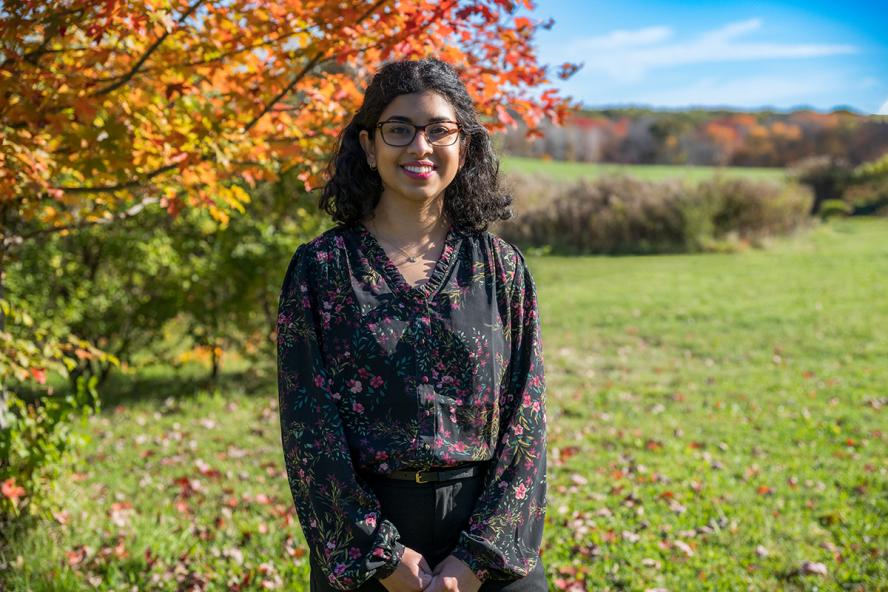“The flexibility of the career path and the things that you can do with public health training, public health knowledge, and a public health degree make our D.V.M./M.P.H. program attractive,” Gatlin explains. “I think it opens up a lot more doors … whether you’re going into industry, government, academia, or even into clinical practice, internships and residencies, and board certification.”
Characterized by Gatlin as “small but mighty” the D.V.M./M.P.H. program helps individuals gain knowledge and perspective that they come to appreciate once enrolled in the program. “As a graduate of the program, it’s a nice full circle to come back and mentor students,” she says. “I was once in their shoes, so I’ve wondered about the possibilities, and I’m delighted to showcase them.”
The daughter of immigrants from India, Gatlin grew up in the Chicago suburbs and got involved with cats and dogs at a local animal shelter as a high school student and liked it. She didn’t feel the same about volunteering at a human health clinic. “It just didn’t feel right for me,” she says.
Gatlin earned a B.A. in political science and biology from Northwestern University, where she came across public health while exploring policy and legislation. While working at a Northwestern lab animal facility one summer, she realized her interests in veterinary medicine, public health, policy, and human health all intersected and wondered if she could bring them together.
After reading more about One Health and its unifying principle of the interconnected health between animals, people, and the shared environment, she applied to vet schools and chose Cummings School for its location, its non-tracking veterinary program, and the D.V.M./M.P.H. program in collaboration with Tufts University School of Medicine.
“It fit what I was looking for … and was a place where I hoped to gain a better understanding of health and science, as practitioners, as veterinarians, or human physicians,” she says. “And what I love about public health is you start to extrapolate that from an individual level to a population.” Gatlin credits her training in political science which helps her see the impact public health has on a macroscopic level.
“As veterinarians, we think about how we go from an individual animal to human and animal populations,” she explains. “We make, then show the world the connections that we’ve made. That’s what this program is about.”
Gatlin brought five years of clinical experience to her role at Cummings School, in which she has served for three years. “And I love it,” she says, spending most of her time teaching, advising, and mentoring students. “I work with them through all four years, helping them understand the importance of their role as clinicians, but also their identity as non-clinicians and what they can do in both the fields of veterinary medicine and public health.”
In addition, Gatlin drew upon her experience as a full-time clinician when asked to oversee how to improve the education students receive in canine reproduction (theriogenology) when Cummings School was approached by local kennel clubs and breeders. “I had a strong caseload in reproduction from my clinical years and gained an appreciation for working with breeders and purebred dogs,” she shares.
Under Gatlin’s tutelage, an elective course—known as a selective on campus—was created in partnership with the American Kennel Club (AKC) for dog breeders to serve as mentors to students, so they could understand the process and mindset from the breeders’ perspective.
“There's often this divide between veterinarians and dog breeders,” Gatlin explains. “They’re both experts, but in different areas. So, this provides an opportunity to tackle some difficult questions and the ethics around different viewpoints.”
Through the selective, students meet a variety of purebred dogs and practice conducting exams, evaluating breeding soundness, and witnessing reproductive procedures, including ultrasounds, X-rays, whelping, and C-sections.
Community events, including roundtable discussions, are also offered, where breeders and veterinarians can discuss a topic decided by students enrolled in the selective. “We’ve talked about the history of the AKC, genetics, and ethical scenarios, among others,” says Gatlin. “It depends on what the students want to learn more about.”
Recently board-certified in the American College of Veterinary Preventive Medicine, Gatlin has set her sights toward research and program evaluation, which could include developing case studies, supporting global health endeavors, and collaborating more with the School of Medicine’s M.D. program.
She shares, “I also hope to evaluate what our alumni are doing and to see how successful they have been to consider what else we can do to improve and grow the D.V.M./M.P.H. program.”
